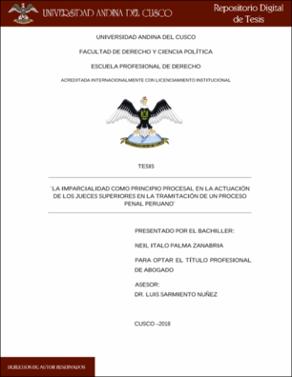| dc.contributor.advisor | Sarmiento Núñez, Luis Alfonso | |
| dc.contributor.author | Palma Zanabria, Neil Italo | |
| dc.date.accessioned | 2018-11-07T17:01:56Z | |
| dc.date.available | 2018-11-07T17:01:56Z | |
| dc.date.issued | 2018-06-19 | |
| dc.identifier.uri | https://hdl.handle.net/20.500.12557/2017 | |
| dc.description.abstract | Los Jueces Superiores conocen actos procesales en específico y para determinar su contaminación debe probarse que han adelantado opinión; sin embargo en ciertas ocasiones pueden acceder a la actividad probatoria de la etapa de investigación preparatoria, ya que en muchos casos será necesario que los Jueces superiores deberán revisar todo o en parte de los actos procesales para resolver la pretensión impugnatoria.
Asimismo uno de los motivos por los cuales se diferencia entre Jueces de Investigación
Preparatoria y Jueces de Juzgamiento, es tratar de evitar que los Jueces de juzgamiento se contaminen con el proceso. Frente a lo señalado, se puede manifestar que en ocasiones el actuar de los Jueces Superiores, en la tramitación de una apelación de sentencia, podría vulnerar el principio de imparcialidad, ya que al encontrarse “contaminados” por conocer con anterioridad los hechos y la actividad probatoria desarrollada, por ejemplo si anteriormente resolvieron una prisión preventiva o una excepción de improcedencia de acción, donde tuvo la oportunidad de conocer y analizar los hechos materia de debate y los elementos de convicción. | es_PE |
| dc.description.abstract | The Superior Judges know specific procedural acts and to determine their contamination
it must be proven that they have advanced their opinion, however in certain cases they can access the probative activity of the preparatory investigation stage, since in many cases it will be necessary that the superior judges should review all or part of the procedural acts to resolve the impugnant claim. Likewise, one of the reasons why there is a difference between Judges of Investigation Preparatory and Judges of Judgment, is to try to avoid that the judges of judging are contaminated with the process. Faced with the above, it can be stated that sometimes the actions of the Superior Judges, in the processing of an appeal of sentence, could violate the principle of impartiality, since when they are “contaminated“ by knowing in advance the facts and activity Evidence developed, for example, if previously resolved a preventive detention or an exception of inappropriate action, where he had the opportunity to know and analyze the facts subject of debate and the elements of conviction. | en_US |
| dc.description.uri | Tesis | es_PE |
| dc.format | application/pdf | es_PE |
| dc.language.iso | spa | es_PE |
| dc.publisher | Universidad Andina del Cusco | es_PE |
| dc.rights | info:eu-repo/semantics/restrictedAccess | es_PE |
| dc.source | Universidad Andina del Cusco | es_PE |
| dc.source | Repositorio Institucional - UAC | es_PE |
| dc.subject | Actos procesales | es_PE |
| dc.subject | Jueces | es_PE |
| dc.subject | Jueces de juzgamiento | es_PE |
| dc.subject | Procesos | es_PE |
| dc.subject | Tramitación | es_PE |
| dc.subject | Apelación | es_PE |
| dc.title | La imparcialidad como principio procesal en la actuación de los jueces superiores en la tramitación de un proceso penal peruano. | es_PE |
| dc.type | info:eu-repo/semantics/bachelorThesis | es_PE |
| thesis.degree.name | Abogado | es_PE |
| thesis.degree.grantor | Universidad Andina del Cusco. Facultad de Derecho y Ciencia Política | es_PE |
| thesis.degree.level | Titulo Profesional | es_PE |
| thesis.degree.discipline | Derecho | es_PE |

